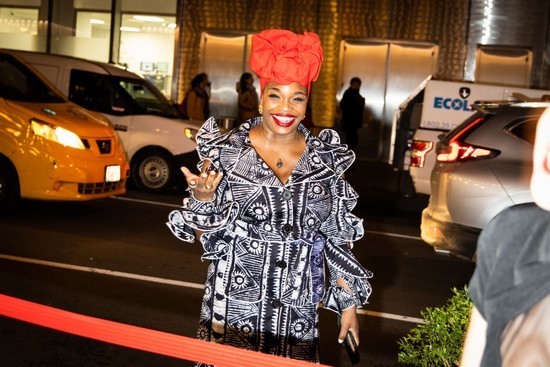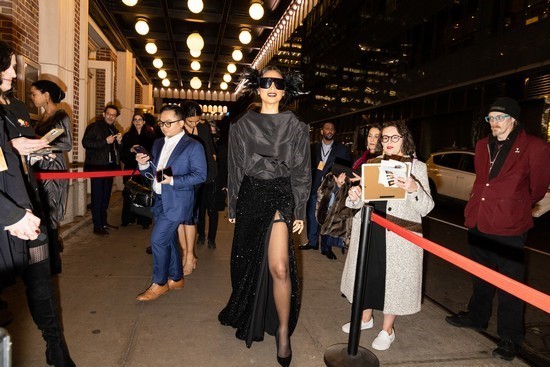NEW YORK, United States — On Thursday evening, more
than 1,000 writers, presenters, and guests gathered for the PEN America
Literary Awards at Town Hall near Times Square. Just before 6pm, the staff set
up a small red carpet area for what has been called the Oscars for books.
اضافة اعلان
Slowly, luminaries from the worlds of literature and
entertainment — Susan Choi, Jennifer Finney Boylan, Lorne Michaels, Diane
Sawyer — arrived. Attendees posed for photos and spoke to the press before
slipping away to sip drinks and mingle. At the ceremony, hosted by actor Kal
Penn, the literary and free speech organization PEN America honored the best
writing from the previous year and conferred more than $350,000 in awards.
 Author Erika
Dickerson-Despenza, at the 2023 PEN America Literary Awards Ceremony, at Town
Hall in New York, on March 2, 2023.
Author Erika
Dickerson-Despenza, at the 2023 PEN America Literary Awards Ceremony, at Town
Hall in New York, on March 2, 2023.
Percival Everett took home the prestigious PEN/Jean Stein
Award, for his novel, “Dr. No”, and Erika Dickerson-Despenza and Vinod Kumar
Shukla were recognized with career achievement awards. Tina Fey was honored
with the PEN/Mike Nichols Writing for Performance Award.
The crowd wore neon Barbie pink, flowers on their lapels,
feathers in their hair, at least one gold bolo tie, and lots of velvet,
glitter, and sparkles. They accessorized with buttons that said, “Free the
Books”.
“I think it’ll do plenty of bad poetry, but not good poetry. I think to be a good poet you have to have soul.”
In the midst of the buzz around the awards and questions
about what they are currently reading, the New York Times asked attendees about
the future of literature, specifically, the potential role that artificial
intelligence might play.
Award-winning AI?Recently, editors at three science fiction magazines said
they had been flooded with AI-generated fiction submissions. Students are using
ChatGPT to write essays, and some teachers are using it as a learning tool.
People are using AI to flirt on dating apps and write their wedding vows. A few
years ago, at least one novelist was starting to use “home-brewed software” as
a tool in his writing process. (One of the presenters at the PEN awards show,
MSNBC’s Ari Melber, even said he had used ChatGPT to write part of his speech.)
So could the next big author be a robot? Could AI take the
jobs of writers and storytellers? Could AI write truly great literature, the
kind that wins awards?
“Sure,” said author David Sedaris, who was wearing a blush
pink flower on his lapel. When it comes to robots, “I don’t think anybody’s job
is safe,” he said.
And if the work was great, would it bother him that it was
not written by a human? “I think it would bother me because there’s another
human out of a job,” he said.
The poetry of
humanityHe reflected on change, generally: “I always thought when
you got to be a certain age, you’d give anything to be younger,” he said. “But
I am so excited to be dead in, like, 20 years. Because there’s not much more of
this I can take.”
For AI to write great literature, “you would have to get inside the brain and find what no one has ever found — no neurologist, no writer investigating their own brain — and capture that essence that generates the beautiful sentences.”
Others were convinced that being human, with all its
messiness and layers of experience, is a key ingredient to magical writing that
a machine cannot replicate.
“I’m not totally sure that AI will really be able to do
poetry,” said actress Molly Ringwald, a presenter at the awards.
“I think it’ll do plenty of bad poetry, but not good poetry.
I think to be a good poet you have to have soul,” said Ringwald, who wore a
pink Ulla Johnson dress with silver Rachel Comey shoes.
Writer Judith Thurman had not really been aware of all the
AI writing tools, “because I’m a Luddite”, she said.
 Geena Rocero, a
presenter at the event, at the 2023 PEN America Literary Awards Ceremony, at
Town Hall in New York.
Geena Rocero, a
presenter at the event, at the 2023 PEN America Literary Awards Ceremony, at
Town Hall in New York.
But recently, she was at an appointment when her doctor
asked how she felt about AI writing. Then he drew her into an experiment: He
asked a bot to do a piece of writing in her style. She gave him a subject and
he returned, she said, with a few paragraphs that sounded like a ninth-grade
term paper. “There was nothing literary about it,” she said.
For AI to write great literature, “you would have to get
inside the brain and find what no one has ever found — no neurologist, no
writer investigating their own brain — and capture that essence that generates
the beautiful sentences,” she said.
‘I’d like to see it try’Others said they’re optimistic that people will still want
to read human writers.
“I don’t feel really threatened by the idea of AI writing,”
said Robert Jones Jr, a presenter at the awards. “I still want to believe that
there’s something about the human being that’s individual enough such that AI
won’t take over our critical arts.”
“I still want to believe that there’s something about the human being that’s individual enough such that AI won’t take over our critical arts.”
Robin Coste Lewis, who won the PEN/Voelcker Award For Poetry
Collection for “To the Realization of Perfect Helplessness”, said she is always
interested in seeing what the human mind can create, even through something
disembodied like artificial intelligence.
But, she said, “I don’t think AI could ever do what Octavia
Butler did, or Asimov did, or Samuel Delany did, in science fiction. I’d like
to see it try.”
At least one attendee had a different fear of artificial
intelligence.
“I don’t want the robots to kill me, but I’m anti-AI
fiction,” comedian Rachel Dratch said. “But I hope that they don’t find out
that I said that because who knows what’s next with this?”
Read more Technology
Jordan News



